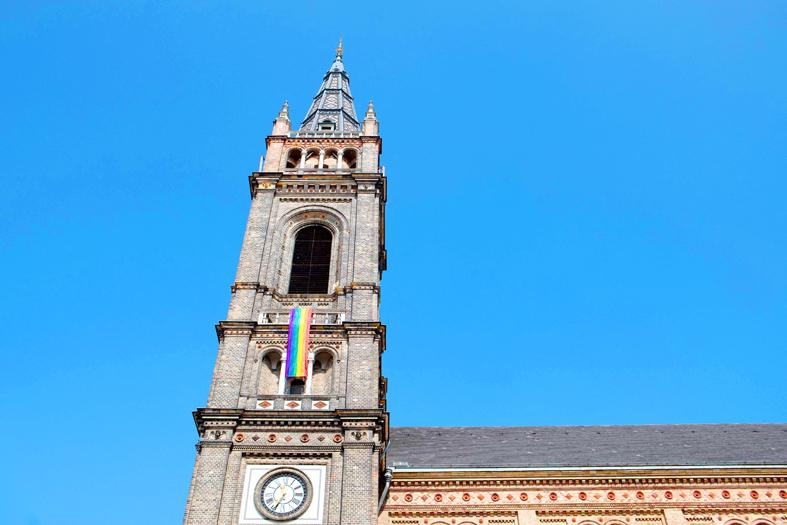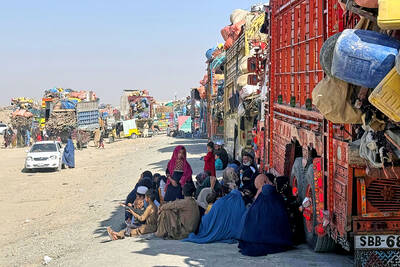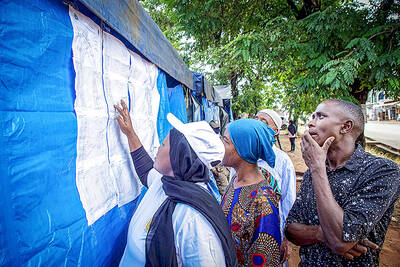The Catholic church of the parish of Hard is one of many in Austria that decided to fly the rainbow flag in solidarity with the LGBTQ community after the Vatican ruled last month that the church could not bless same-sex partnerships.
The powerful Vatican office responsible for defending church doctrine, the Congregation for the Doctrine of the Faith (CDF), handed down a ruling that same-sex unions could not be blessed despite their “positive elements.”
The office wrote that while God “never ceases to bless each of his pilgrim children in this world... he does not and cannot bless sin.”

Photo: AFP
Hard’s parish priest, Erich Baldauf, said that he and the hundreds of other clergy who belong to the reform-oriented Priests’ Initiative movement decided to fly the flag to show “that we do not agree with this outdated position,” with many other churches also making the gesture.
Soon after the rainbow flag in Hard was put up, there was an attempt to damage it, and on March 30, Baldauf was saddened to discover that it had been burned.
“We were shocked... It pains us,” Baldauf said.
While the perpetrator had not been caught and there was no proven motive, Baldauf said that other flags flown in the same place had never been subject to attack.
In the following days, another rainbow flag outside a church, also in the far western state of Vorarlberg, was burned, while a third was stolen.
Contrary to the impression that these incidents might give, surveys have shown that Austrian public opinion is firmly on the side of equal treatment for same-sex couples.
Same-sex marriage has been legal in Austria since 2019 and a survey last week found that a full 64 percent of respondents in the country opposed the Vatican’s recent decision.
A mere 13 percent of respondents said that they could understand the Vatican’s stance.
Austria is still a majority Catholic country, with the church counting nearly 5 million adherents in a country of 8.8 million.
However, this represents a steep decline from the decades after World War II, in which almost 90 percent of Austrians belonged to the church.
Experts have said that differences between Austrian social attitudes and the church’s teaching on issues, such as homosexuality and abortion, contribute to tens of thousands choosing to leave the church each year.
It is not just the explicitly reform-oriented Priests’ Initiative that has spoken out against the CDF ruling.
No less a figure than the Archbishop of Vienna, Cardinal Christoph Schoenborn, said that he was “not happy” with the Vatican’s pronouncement.
“The message that went out via the media to the whole world was a simple ‘no’ and in fact a ‘no’ to blessing, which is something that hurts many people to their core,” he told the Catholic newspaper Der Sonntag.
Toni Faber, priest of Vienna’s iconic St Stephen’s Cathedral, was even more forthright.
“If I had the job of causing the most damage possible to the church with two pages of text, I would write exactly the sort of letter that the Congregation for the Doctrine of the Faith has written,” he told the Profil news magazine.
The CDF’s statement “totally misfired” in the aim of “upholding the sacrament of marriage,” Faber said, adding that none of the heterosexual couples that he marries “feel diminished by the fact that I give blessings to same-sex couples.”
The unhappiness has found an echo among Germany’s Catholics, with priests using a hashtag calling for “disobedience” online.
While some prominent German bishops have supported the Vatican’s stance, others accused the CDF of seeking to stifle theological debates, which have been active among German Catholics in recent years.
A German petition calling for the CDF’s ruling to be ignored has been signed by 2,600 priests and deacons, as well as 277 theologians.
The reaction in Germany and Austria speaks to broader global fault lines on social issues between socially conservative and liberal congregations.
However, Jesuit priest and former head of Vatican Radio’s German section Bernd Hagenkord said that German-speaking countries also have “a very particular tradition of theology that acts very independently” and is less amenable to being overruled by the hierarchy of the church.
Back in Hard, the parish church decided to leave the remnants of the burned flag in place for several days after the attack.
“It had the effect of a cross,” Baldauf said.
However, in time for Good Friday, a new rainbow flag flew proudly outside the church, a sign of welcome for all parishioners at Easter.

With much pomp and circumstance, Cairo is today to inaugurate the long-awaited Grand Egyptian Museum (GEM), widely presented as the crowning jewel on authorities’ efforts to overhaul the country’s vital tourism industry. With a panoramic view of the Giza pyramids plateau, the museum houses thousands of artifacts spanning more than 5,000 years of Egyptian antiquity at a whopping cost of more than US$1 billion. More than two decades in the making, the ultra-modern museum anticipates 5 million visitors annually, with never-before-seen relics on display. In the run-up to the grand opening, Egyptian media and official statements have hailed the “historic moment,” describing the

‘CHILD PORNOGRAPHY’: The doll on Shein’s Web site measure about 80cm in height, and it was holding a teddy bear in a photo published by a daily newspaper France’s anti-fraud unit on Saturday said it had reported Asian e-commerce giant Shein (希音) for selling what it described as “sex dolls with a childlike appearance.” The French Directorate General for Competition, Consumer Affairs and Fraud Control (DGCCRF) said in a statement that the “description and categorization” of the items on Shein’s Web site “make it difficult to doubt the child pornography nature of the content.” Shortly after the statement, Shein announced that the dolls in question had been withdrawn from its platform and that it had launched an internal inquiry. On its Web site, Le Parisien daily published a

‘NO WORKABLE SOLUTION’: An official said Pakistan engaged in the spirit of peace, but Kabul continued its ‘unabated support to terrorists opposed to Pakistan’ Pakistan yesterday said that negotiations for a lasting truce with Afghanistan had “failed to bring about a workable solution,” warning that it would take steps to protect its people. Pakistan and Afghanistan have been holding negotiations in Istanbul, Turkey, aimed at securing peace after the South Asian neighbors’ deadliest border clashes in years. The violence, which killed more than 70 people and wounded hundreds, erupted following explosions in Kabul on Oct. 9 that the Taliban authorities blamed on Pakistan. “Regrettably, the Afghan side gave no assurances, kept deviating from the core issue and resorted to blame game, deflection and ruses,” Pakistani Minister of

UNCERTAIN TOLLS: Images on social media showed small protests that escalated, with reports of police shooting live rounds as polling stations were targeted Tanzania yesterday was on lockdown with a communications blackout, a day after elections turned into violent chaos with unconfirmed reports of many dead. Tanzanian President Samia Suluhu Hassan had sought to solidify her position and silence criticism within her party in the virtually uncontested polls, with the main challengers either jailed or disqualified. In the run-up, rights groups condemned a “wave of terror” in the east African nation, which has seen a string of high-profile abductions that ramped up in the final days. A heavy security presence on Wednesday failed to deter hundreds protesting in economic hub Dar es Salaam and elsewhere, some